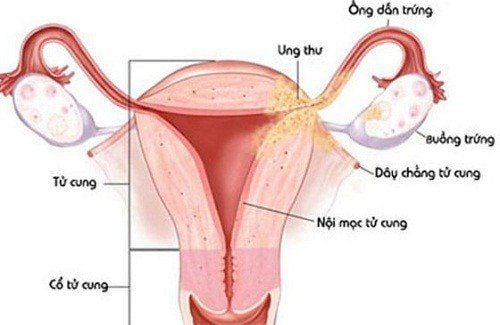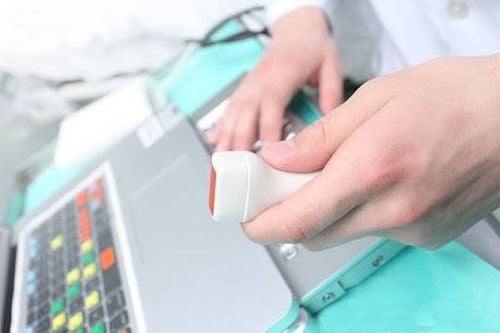This is an automatically translated article.
The article is professionally consulted by Master, Doctor Thai Bang - Head of Obstetrics and Gynecology - Department of Obstetrics and Gynecology, Vinmec Nha Trang International General Hospital.Adnexitis is a fairly common gynecological disease in women, causing inflammation in the appendages including the fallopian tubes, ovaries and broad ligament system. This disease is one of the main causes of ectopic pregnancy and infertility in women,... Therefore, understanding and understanding the disease, knowing how to prevent it will help women avoid it. unfortunate consequences later.
1. Inflammation of the appendages and signs to recognize The appendages in women include: Fallopian tubes (fallopian tubes), ovaries, wide ligament system. Adnexitis is simply understood as a gynecological disease that causes inflammation in the appendix. Adnexitis usually begins in the fallopian tubes and then spreads around.
Inflammation of the appendix is a consequence of unsafe sex, keeping the intimate area clean, birth complications such as: unsafe abortion, scraping of vegetables, peeling of vegetables after childbirth,. .. Besides, appendicitis often occurs secondary to gynecological inflammatory diseases such as inflammation of the vagina, vulva, uterus, cervix or uterine lining. Adnexitis can be of two types, acute appendicitis and chronic adnexitis.

Lower abdominal pain is the most common symptom of the disease. Inflammation of the appendix will produce dull pain in the lower abdomen and is within the tolerance of women, so it is often ignored. The pain is only more pronounced with vigorous exercise. Pain in the lower abdomen will increase in intensity when the disease is severe, when pressing on the lower abdomen or during defecation and during sex. In addition, the hip is also often painful and tired even before the period. Fever: Severe gynecological infections will also make the body tired, the resistance will decrease, making women sick and fever, usually high fever, can be up to 40 degrees Celsius. During a fever, the patient has fever. You may feel shivers, feel chills, and your temperature will go up and down. In addition, patients may also experience symptoms of dizziness and nausea. Vaginal discharge abnormality: Inflammation of the appendix also causes discharge from the vagina with an unpleasant fishy smell, unusual color (yellow or green), solid or liquid form, sometimes accompanied by pus. Painful or painful urination: Prolonged appendicitis will directly affect nearby organs, including the bladder and ureters. These two parts will be compressed leading to urinary incontinence, painful urination and water retention in the kidneys. Menstrual disorders: Heavy menstrual bleeding during menstruation, irregular bleeding, severe menstrual pain, abnormally prolonged menstrual cycle, menstrual blood is black, clotted, may bleed between periods menstrual period. In addition, some women also experience burning pain in the private area, pain during intercourse, low back pain, digestive disorders, if left for a long time, inflammation of the appendages can lead to pelvic peritonitis. , generalized peritonitis, blood infection. In general, the signs to recognize appendicitis are quite similar to other gynecological diseases. Therefore, if you experience these symptoms, you need to see a doctor to get an accurate diagnosis.

Unsafe sex is the root cause of gynecological diseases in general, including appendages. Improper hygiene of the intimate area will cause gynecological diseases such as vaginitis, cervical ectropion, cervicitis and appendicitis. During menstruation, a woman's cervix and vagina are usually wider than usual so that menstruation can pass out easily. This is also the time when the vaginal environment is often wet, creating conditions for bacteria to enter and cause disease from there, creating opportunities for gynecological diseases including appendicitis to form and develop. Having too many births, frequent abortions, and unsafe abortions will damage your reproductive organs and make it very difficult to recover. Besides, after giving birth, abortion, miscarriage, women's resistance is also significantly reduced. These two factors create conditions for factors harmful to health, especially the private area, to have the opportunity to develop, spread and cause gynecological diseases and appendicitis. Using unsafe medical procedures: Medical procedures such as: IUD insertion, IUD insertion, ... if not performed properly, not sterile, performed by medical staff inexperienced can lead to inflammation of the genital organs including appendages. Inappropriate clothing: Regularly wearing clothes that are too tight, especially underwear, will make the intimate area often pressurized and wet. Prolonged wet conditions will create favorable conditions for bacteria and fungi to penetrate and grow in the intimate area, specifically vaginitis. Long-term vaginitis can lead to the infection going up the fallopian tubes, causing inflammation and blockage of the fallopian tubes and then spreading to the surrounding areas. Long-lasting gynecological inflammation: The parts of a woman's genital organs are closely related to each other. If an infected organ is not completely treated, or the infection has worsened, it will affect other genital organs, including the appendix. 3. Consequences of appendicitis Adnexitis is divided into acute appendicitis and chronic adnexitis. If acute appendicitis is not treated definitively and in time, it will turn to chronic appendicitis. Chronic appendicitis causes a great deal of discomfort to the patient and can hardly be completely cured, the bacteria are still present, so an occasional flare-up occurs. Not stopping there, appendicitis also causes a series of dangerous consequences.
High ectopic pregnancy: When the appendages are inflamed, the fallopian tubes are at high risk of inflammation as well. Inflammation of the fallopian tubes can lead to blockage and narrowing, preventing the egg from going deep into the uterus to implant. Therefore, the egg can implant outside the uterus and cause an ectopic pregnancy, which is very dangerous for the woman. Infertility: Inflammation of the appendages will affect the egg production process, reducing the quality of eggs. At the same time, inflammation of the fallopian tubes can completely block the fallopian tubes, making it impossible for the egg to meet the sperm and hinder the fertilization process. If you can conceive, but the egg quality is not good, it will also greatly affect the development of the fetus in the future. Affects other parts of the body, especially the genitals. If the inflammation of the appendix lasts for a long time, it will cause bacteria to spread to the surrounding parts and then cause disease there and lead to a series of other gynecological diseases: Vaginitis, vulva, metritis, even cancer cervicitis,... Affects quality of life: Prolonged appendicitis makes the patient's body weak, often tired, sick, feeling nauseous and vomiting. Adnexitis can cause pelvic peritonitis, generalized peritonitis, sepsis, and possibly death. Adnexitis needs to be treated early to prevent these consequences as shared above. Usually, doctors will use antibiotics, anti-inflammatory drugs (oral or vaginal form). These drugs have the effect of bactericidal, killing infectious agents, laparoscopic surgery when medical treatment of the inflammatory block reduces little or the inflammatory block turns to chronic.

Clean the private area every day, do not abuse the detergents in the private area. Special attention should be paid to hygiene of the intimate area during menstruation, after performing an abortion. Safe sex. Complete treatment of gynecological diseases such as cervical ectropion, vaginitis, ... to avoid reverse bacterial infection leading to appendicitis. Go for regular gynecological exams. Pay attention, care and listen to your body every day, if there are abnormal symptoms such as menstrual disorders, unpleasant odors, frequent abdominal pain, you should see a doctor.
To help customers prevent gynecological diseases as well as detect and treat them promptly, the basic gynecological examination and screening package at Vinmec International General Hospital has been developed for Customer object:
Female customer has abnormal symptoms such as: Abnormal vaginal bleeding; Menstrual problems; Abnormal vaginal discharge (with a bad smell, a different color than usual); Pain, itching in the private area,... Female customers have some risk factors such as poor personal hygiene, unsafe sex, abortion,... Female customers have symptoms of infection other. The basic gynecological examination and screening package helps customers to detect inflammatory diseases early for easy and inexpensive treatment; screening for early detection of gynecological cancer (cervical cancer),...
Please dial HOTLINE for more information or register for an appointment HERE. Download MyVinmec app to make appointments faster and to manage your bookings easily.














